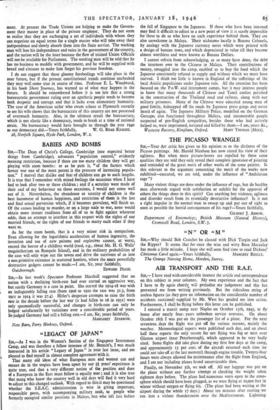"LEGACY OF JAPAN"
Su,—As I was in the Women's Section of the Singapore Internment Camp, and was therefore a fellow internee of Mr. Bennitt's, I was much interested in his article "Legacy of Japan" in your last issue, and am pleased to find myself in almost complete agreement with it.
That many old ideas of what European men and women can and cannot do in the tropics have been upset by our 31 years' experience is quite true, and that a very different notion of the position and dues of a European in the East must follow is equally true ; and it is also true that tram( who knew the country well in old days will find it very hard to adjust to this changed outlook. With regard to this it may be questioned whether the S.E.A.C. administration is wise in giving important, responsible posts, with accompanying military rank, to people who formerly occupied similar positions in Malaya, but. who left just before the fall of Singapore to the Japanese. If those who have been interned may find it difficult to adjust to a new point of view it is surely impossible for these to do so who have no such experience behind them. They are also unwelcome in Malaya. 'Pheir nickname locally is Banana Colonels, by analogy with the Japanese currency notes which were printed with a design of banana trees, and which depreciated in value till they became almost worthless and were known as Banana Dollars.
I cannot refrain from acknowledging, as so many have done, the debt the internees owe to the Chinese in Malaya. Their contributions of money, smuggled into the camp, enabled us to buy the food which the Japanese consistently refused to supply and without which we must have starved. I think too little is known in England of the sufferings of the local Asiatic populations under Japanese rule. All the attention has been focused on the P.o.W. and internment camps, but it may interest people to know that many thousands of Chinese and Tamil coolies perished in the construction of the Thailand road and railway, along with our military prisoners. Many of the Chinese were educated young men of good family, kidnapped off the roads by Japanese press gangs and never heard of again. The Japanese Military Police, modelled on the German Gestapo, also functioned throughout Malaya, and innumerable people suspected of pro-English sympathies, besides those who had actively helped us, were imprisoned, tortured and killed by them.—I am, yours &c.,
Westcote Rectory, King ham, Oxford. MARY THOMAS (MISS).


























 Previous page
Previous page